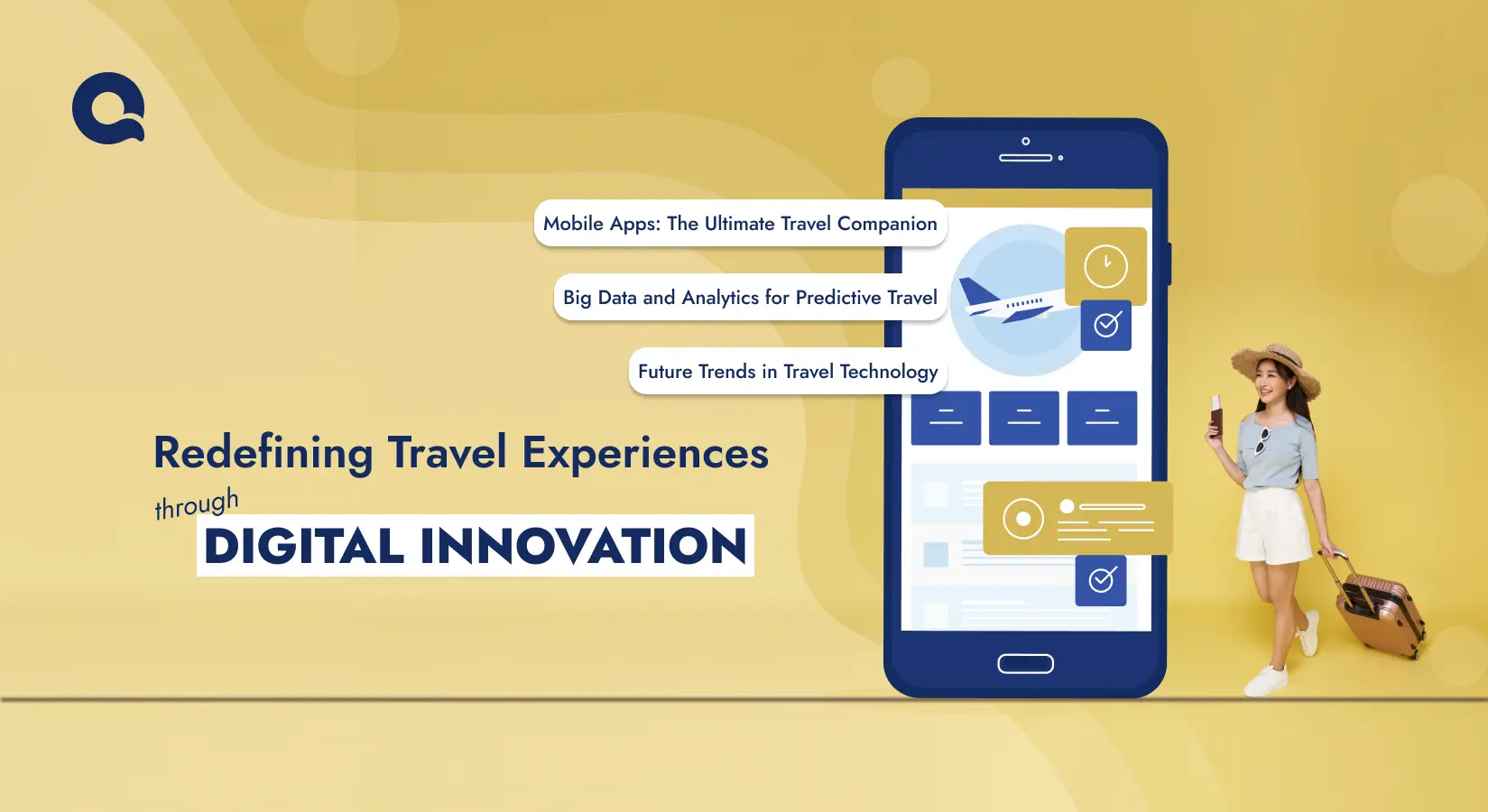
The travel industry has witnessed a significant shift in recent years, all thanks to digital innovation. From how we book our flights to the ways we explore destinations, technology has redefined every aspect of the travel experience. With advancements in artificial intelligence (AI), augmented reality (AR), big data, and mobile technology, travelers are now more empowered, connected, and informed than ever. In this article, we’ll explore how digital innovation is transforming the travel landscape, creating new possibilities for travelers and redefining what it means to explore the world.
1. Personalized Travel Planning with Artificial Intelligence
One of the biggest changes in travel has been the ability to tailor trips based on individual preferences. With the help of AI and machine learning, travel companies can offer personalized recommendations that make trip planning both efficient and exciting.
- Customized Itineraries: AI-based platforms like Google Trips and TripIt use data from past travels, personal preferences, and even local events to recommend activities and destinations that suit individual interests. This personalization ensures travelers make the most out of their journey.
- Efficient Customer Support: AI-powered chatbots provide instant customer support, answering frequently asked questions and resolving issues quickly. This reduces wait times, enhances the travel booking experience, and keeps customers satisfied.
2. The Rise of Virtual Reality and Augmented Reality in Travel
Imagine being able to explore a destination virtually before setting foot there. Virtual reality (VR) and augmented reality (AR) are making this possible, allowing travelers to immerse themselves in destinations from the comfort of their homes.
- Pre-Travel Destination Exploration: Travel agencies and tourism boards now offer VR tours that let potential visitors experience popular landmarks, hotels, and activities. By using VR headsets, travelers can visualize their destinations in a 360-degree view, helping them make informed decisions about their travel plans.
- On-Site Augmented Guidance: AR apps such as Google Lens enhance on-site experiences by providing real-time information and translations. Travelers can scan monuments, restaurants, and attractions to access detailed historical data, reviews, and even local language translations.
3. Blockchain for Enhanced Security and Transparent Transactions
Blockchain technology has introduced new possibilities for secure, transparent transactions in the travel industry. It enables travelers to make payments, verify identities, and complete bookings without worrying about fraud or hidden charges.
- Decentralized Payments: Blockchain-based payment methods, including cryptocurrencies, are now accepted by some travel agencies and airlines. This gives travelers the flexibility to pay in various ways, reducing dependency on banks and credit cards.
- Improved Identity Verification: Blockchain also simplifies identity verification, enabling travelers to breeze through check-in and immigration processes. Digital identities stored securely on the blockchain streamline the travel experience, making it safer and faster.
4. Mobile Apps: The Ultimate Travel Companion
Mobile apps have become indispensable in travel, offering a seamless way to book, manage, and explore all in one place.
- Booking and Itinerary Management: Apps like Airbnb, Expedia, and Kayak allow travelers to book accommodations, flights, and tours directly from their smartphones. They also manage itineraries, send reminders, and notify travelers of any changes in real time.
- Offline Accessibility: Many travel apps now offer offline access to maps, guides, and itineraries, ensuring travelers remain informed even in remote areas without an internet connection.
5. IoT and Smart Devices for Enhanced Travel Experiences
The Internet of Things (IoT) is transforming travel by connecting devices to create smarter, more convenient experiences.
- Smart Airports and Hotels: IoT-enabled airports provide a streamlined experience through automated check-ins, luggage tracking, and real-time notifications about boarding gates and flight statuses. Similarly, smart hotels allow guests to control room temperature, lighting, and even curtains through their smartphones or voice assistants.
- Connected Luggage: Smart luggage is equipped with GPS tracking, weight sensors, and digital locks, ensuring that travelers can monitor and secure their belongings from anywhere. This added convenience brings peace of mind, especially during long-haul travels.
6. Big Data and Analytics for Predictive Travel
Big data is revolutionizing how travel companies anticipate and respond to customer needs.
- Demand Prediction: By analyzing patterns in booking data, airlines, and hotels can predict peak travel times, optimize pricing, and manage resources accordingly. This approach boosts profitability while also improving customer satisfaction.
- Targeted Marketing and Recommendations: Travel companies use big data to analyze customer preferences, enabling them to send targeted promotions and suggestions that align with traveler interests. This enhances the booking experience and encourages repeat business.
7. Sustainable Travel Through Digital Innovation
Sustainability has become a priority in travel, and digital tools are paving the way for eco-friendly practices.
- Green Accommodation Filters: Platforms like Booking.com and Airbnb allow travelers to search for eco-certified hotels, helping environmentally conscious travelers make sustainable choices.
- Paperless Travel: E-tickets, mobile boarding passes, and digital payments reduce paper use, making travel more eco-friendly. Additionally, travelers can support green initiatives by opting for carbon offset programs during bookings.
8. Future Trends in Travel Technology
As technology continues to advance, the future of travel looks increasingly promising.
- Hyper-Personalized Experiences: As AI and big data advance, travel services will offer even more personalized experiences, making it possible to tailor trips to a traveler’s specific interests and budget.
- Voice and Facial Recognition: Biometric technology is expected to become a standard in airports and hotels, reducing the need for physical documents and making check-ins faster and safer.
- Space Tourism: Though still in its infancy, space tourism is an emerging field. Companies like SpaceX and Blue Origin are exploring ways to make space travel accessible to more people, expanding the boundaries of exploration.
Conclusion:
Digital innovation is revolutionizing travel, providing convenience, personalization, and safety to an industry that thrives on exploration and discovery. From AI-powered customization to secure blockchain transactions and IoT-enhanced experiences, technology is setting new standards for how we experience the world. As these technologies continue to evolve, the future of travel promises even greater innovation, allowing us to travel smarter, safer, and more sustainable. Embracing these advancements can enrich our journeys, turning each trip into a memorable adventure shaped by digital possibilities.
Frequently asked questions
AI technology allows travel companies to customize trips by analyzing user data such as travel history, preferences, and local events. This means travelers receive tailored recommendations on destinations, activities, and accommodations, making planning easier and more suited to individual needs.
VR and AR technology allow travelers to virtually explore destinations before visiting, providing a preview of landmarks, hotels, and attractions. During travel, AR tools like Google Lens offer real-time information and translations, enriching the on-site experience.
Blockchain technology ensures secure, transparent transactions by offering decentralized payments and simplified identity verification. This enhances the security of payments, reduces fraud, and speeds up check-in processes at airports and hotels.
Digital tools support sustainable travel by enabling eco-friendly options like digital tickets, mobile boarding passes, and carbon offset programs. Many platforms also provide filters for eco-certified accommodations, helping travelers make more environmentally conscious choices.






